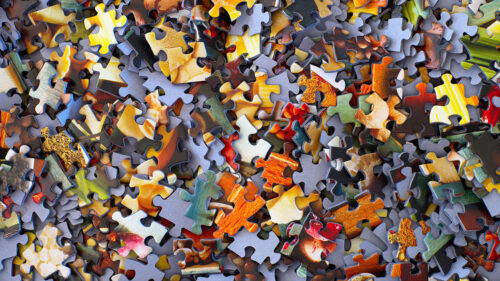America’s Secret Sauce: Self-determination
The last five years have produced what forbearing historians, muttering their observations from the comfort of overstuffed club chairs, might call a generational setback, even while it may feel more like a catastrophic collapse in the moment. Between the Covid-19 pandemic and the rise of violent authoritarianism, the health and the general welfare of our civilization have suffered tremendous blows. Recovery will be slow and arduous. Globalization, which had been underway for thirty years, has come to an abrupt halt. Its principal benefits—economic growth and peaceful coexistence—were interrupted by the pandemic, then dismembered by Putin’s war. Meanwhile, addressing climate change, which can only be mitigated by a combination of cooperation, sacrifice, and extraordinary investment in energy innovation and infrastructure, now appears headed for a fully realized nightmare. Once differential population and economic growth rates collide with mandatory climate migration affecting not millions, but hundreds of millions of people, an apocalyptic ending to civilization is highly plausible. This is all enough to make even the strongest among us throw up our hands and walk off the nearest cliff.
But we haven’t and we won’t.
The thing about periods of both dramatic growth and sudden decline is they end in whiplash. We surge, we collapse, we purge, and we rise again. In one sentence, this is the pulse of humanity that has repeated for thousands of years. The purge, which includes casting aside old ways for new ones and is essential to renewal, is underway. History suggests that the invincibility of the human spirit will shine through the darkness to light a new path. The vast majority of us have suffered loss. The range of loss is wide, from lives to opportunities forgone. What we are now beginning to experience, however, is the extraordinary resilience of the human spirit. The sun still rises and sets, and between these events we forge new paths to pursue our dreams, from the grandiose to the sublime to those as simple as sweet peace. As bleak as our prospects appear today, we are learning and purging to reinvent our future. We have been awakened and humbled by our losses. We are beginning to appreciate what we had taken for granted and we are now deploying the knowledge we gained during the whiplash of collapse to prevent future tragedies.
New knowledge gained during the pandemic is being applied to all manner of public health issues that will not only serve us well when the next super-virus unloads its wrath upon the world, but will also mitigate a number of endemic diseases that have ravaged humankind for decades, even centuries. In addition, authoritarianism, whose first victim is human liberty, has peaked. In a foolish fit of overreach (which always signals the end of authoritarian regimes), Putin is now showing the world, and especially his own people and other wannabe fascists, what happens when you attempt to crush human liberties. Will he gain land in the end? Yes. But the cost of the acquisition far outweighs the benefits of his gain. The bleak days of Stalin are coming back. Putin the Great is a fading fantasy. In time, the Russian people will suffer as much or more as the people of Ukraine and Putin will succumb to the darkness of his delusions. In Xi’s case, China is also now experiencing what happens when you crush human liberties in his authoritarian attempt to assert his zero-Covid policy. Ineffective and insufficient vaccinations are no match for Mother Nature. She can humble even the largest iron fist. Lockdowns have also prevented native immunity from taking hold. Burying your head in the sand is a highly ineffective strategy for dealing with crises. Today, the people of China are suffering the dark side of authoritarianism after years of believing they had cracked the code of blending open markets with closed politics.
As Thomas Friedman wrote in the New York Times,
In short, both Moscow and Beijing find themselves suddenly contending with much more powerful and relentless forces and systems than they ever anticipated. And the battles are exposing—to the whole world and to their own people—the weaknesses of their own systems. So much so that the world now has to worry about instability in both countries.
Historically in America, we have watched these regimes come and go while standing proudly on our own commitment to democracy and human rights. But this time is different. We have work to do, too. We have allowed quasi-authoritarianism to poison our own government and society. The executive branch under Trump did everything in its power to destroy democratic norms and crush human liberty, and the legal branch—principally the Supreme Court—is set up to continue pursuing this theme of limited rights and concentration of power. Standing in their way will be, as in Russia and China, the will of the people.
The good news is while we haven’t suffered the same losses coming to the people of Russia and China, I hope we have been sufficiently aroused by our own loss of liberty to rein in those who masquerade as patriots while offending the fundamental spirit of Americans who believe their future should be—now and forever—in their own hands. At its most basic level, our founders went to great lengths to assure skeptical colonists—most of whom arrived here to escape tyranny in their homelands—that its government would limit the assertion of power at both the federal and state level. Alexis de Tocqueville scratched his head over what he called “self-interest rightly understood,” concluding that American’s enlightened self-determination served both the individual and government. Chiseled into the chest of the American soul is the inalienable right to be who we want to be—on our own terms. Self-determination is the basis of our founding documents and it underpins our conception of the American Dream. It is the reason we will, eventually, restore our democratic principles.
In a post-pandemic and post-Trump world, I expect the right to self-determination will be aggressively asserted; perhaps even more so than at the founding. It is kryptonite to authoritarianism and it is in full bloom in the United States today. We saw it manifested in the battles over mask and vaccine mandates, and we have also seen it in movements to protect women’s rights, gender and sexual preference rights, and to defeat racial, ethnic, and religious discrimination. Self-determination is the common thread to movements on both the left and the right; it permeates the entire American political spectrum. Those seeking common ground take note: self-determination is America’s binding epoxy of unity. It is the essence of libertarianism, which has driven Americans for nearly two-hundred fifty years. Of course, its assertion is often quickly compromised by hypocrisy when rights are asserted in an attempt to control others—to rob them of their own self-determination—but, on the whole, it prevails. Moreover, it is essential to the American experiment. My on-going beef with Republicans is their twisted desire to tell others what they can and cannot do with their bodies. Meanwhile, I often cringe when Democrats attempt to assert similar controls over people’s wealth and property. Both parties need an occasional smack upside the head. What we must realize today is that our liberties are the source of our attraction and power. And, they are the principal pathway to move from purge to renewal—to rising again.
So, what does this mean for each of us, as individuals?
In 1941, President Franklin Delano Roosevelt advocated four freedoms: the freedom of speech, the freedom of worship, the freedom from want, and the freedom from fear. I grew up in an era when the freedom froms were largely mitigated, which left my generation to concentrate on the freedom ofs. We were the first generation to extend freedom ofs beyond speech and worship. We enjoyed the freedom of the American Dream: to become whatever we wanted to be. The results were nothing short of astonishing: the greatest expansion of human welfare in the history of humankind. Our needs were met; we had the luxury of pursuing our wants. What we lost sight of was the danger of escalating wants which, in the last few years, has cost us many of our freedoms. Our success compromised our liberty.
Eastern traditions of spirituality explain this conundrum best. The ultimate key to liberation (and power) is the suppression—not the escalation—of our wants. Every time we look at the world before us and decide we want something that isn’t there, we render ourselves vulnerable to manipulation and suffering. In addition, we foster complex regimes that increase risk when simple regimes are often more than sufficient to assure our well-being. Among other things, escalating wants and the economic growth necessary to realize them produced enormous increases in the consumption of fossil fuels, which is the fundamental cause of climate change. Instead of moving seamlessly up Maslow’s hierarchy of needs from safety and security to actualization and, ultimately, transcendence, we got stuck on a treadmill of chasing extravagant lifestyles under the false hope of finding peace and tranquility. Instead, we left ourselves highly vulnerable to those intent on manipulating us for their own benefit; to trading our liberties for the empty promises of people like Trump, Putin, and Xi. Escalating wants has left us physically, emotionally, and mentally ill. Literally, ill.
Rising again requires we learn, purge, and return to regard America’s secret sauce: self-determination, as both a humble and essential human right. Further, we must respect each of our particular interpretations of what that means on our own terms. Finally, we must realize that escalating wants is killing both our individual prospects for tranquility and the very future of humanity. Enough must indeed be, enough. The maxim, “Less is more” must, once again, become fashionable. As Thomas Paine suggested at the time of our declaration of independence, “We have it within our power to begin the world over again.” It is the responsibility of each and every one of us to both grasp the gravity of our current circumstances and to summon the will to make what difference we can to, individually and collectively, rise again. Feel free to look over the edge of the cliff, but only to realize why you should step back and try, try, again.










